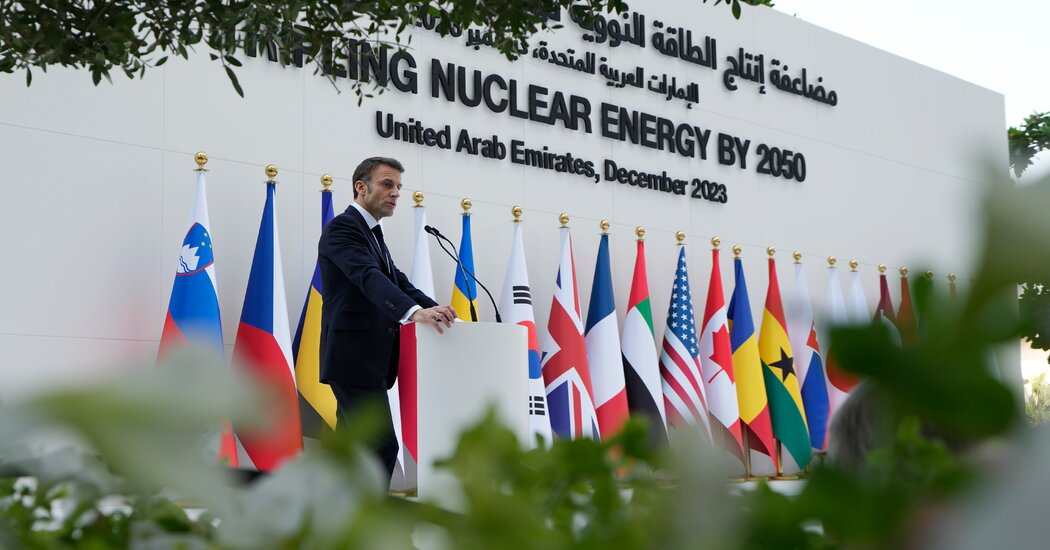22 Nations Commit to Tripling Nuclear Power Output to Reduce Reliance on Fossil Fuels
December 3, 2023 | by Kaju

At the United Nations climate summit in Dubai, the United States and 21 other countries vowed to triple nuclear energy capacity by 2050. This initiative aims to significantly reduce carbon emissions in the coming decades.
Nuclear energy proponents argue that it is a clean, safe, and reliable complement to wind and solar energy. However, an obstacle to its expansion is the high cost of construction.
Last month, a small nuclear reactor project in Idaho was canceled due to a steep increase in construction costs. This rise was attributed to growing interest rates and inflation, with costs soaring from $5.3 billion to $9.3 billion.
Among the 22 countries that signed the declaration to triple nuclear capacity were Britain, Canada, France, Ghana, South Korea, Sweden, and the United Arab Emirates.
Tripling nuclear energy capacity by 2050 is also seen as a strategic move to reduce Europe’s reliance on oil and gas from Russia. However, this endeavor requires substantial investment, and in advanced economies where nearly 70 percent of global nuclear capacity resides, investment has stalled due to escalating construction costs and project delays.
John Kerry, President Biden’s climate envoy, emphasized the availability of “trillions of dollars” for investment in nuclear energy. He stressed that achieving net-zero emissions by 2050 is not possible without nuclear energy.
Nuclear power is emissions-free, and according to an International Energy Agency report, it is vital for reducing carbon emissions in line with the Paris Agreement goals.
President Emmanuel Macron of France labeled nuclear energy, including small modular reactors, as an “indispensable solution” in combating climate change. France, the largest nuclear power producer in Europe, generates about 70 percent of its electricity from nuclear stations.
Mr. Macron and other leaders, such as Prime Minister Ulf Kristersson of Sweden, called on the World Bank and international financial institutions to assist in financing nuclear projects. Mr. Kristersson emphasized the need for governments to share financial risks and provide incentives for investments in nuclear energy.
While some world leaders consider nuclear energy the most effective alternative to fossil fuels, certain climate activists remain skeptical. David Tong, a researcher at Oil Change International, criticized the pledge, stating that nuclear energy is too expensive and slow to be a significant player in the energy transition.
He rejected the notion that nuclear power is the only way to limit global warming to 1.5 degrees Celsius above preindustrial levels, a goal set in the Paris Agreement. Masayoshi Iyoda, an activist from Japan with 350.org, also voiced concerns, citing the Fukushima nuclear disaster as evidence that nuclear power is a dangerous distraction from decarbonization goals.
According to Mr. Iyoda, renewable energy and energy efficiency are cheaper, safer, and faster solutions to the climate crisis. Furthermore, he highlighted that almost all construction of new reactors since 2017 were designed by Russia or China, with China expected to surpass other nations in nuclear power production by 2030.
Nuclear capacity saw a rise in the 1980s, especially in Europe and North America, before experiencing a sharp decline following accidents at Three Mile Island in Pennsylvania in 1979 and Chernobyl in 1986. Subsequently, new technology and stricter regulations have been implemented to enhance safety.
Public opinion on nuclear power in the United States has been shifting, with a growing number in favor of its expansion compared to previous years, according to a Pew Research Center study published in August.
RELATED POSTS
View all


